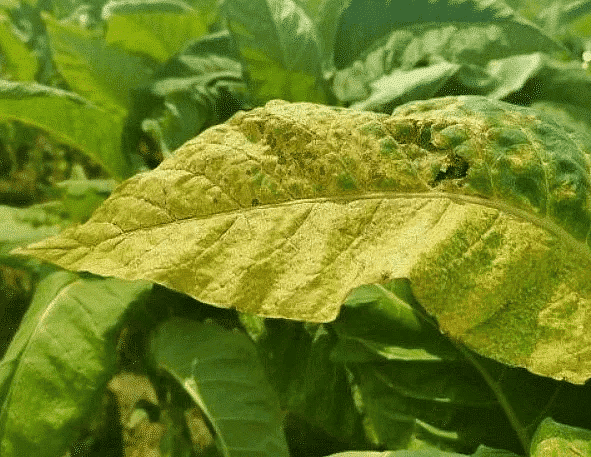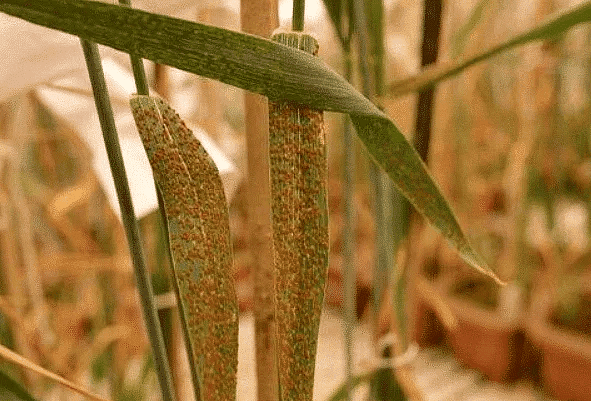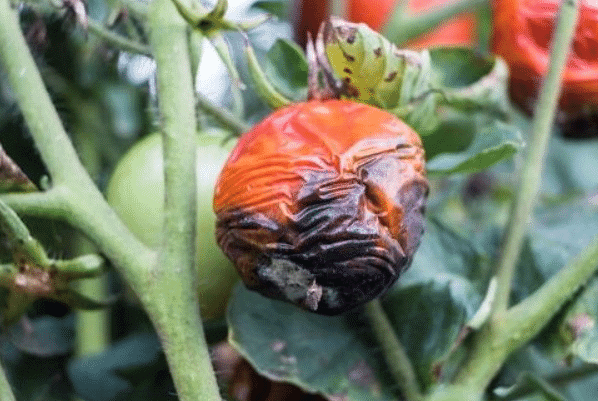UPSC Exam > UPSC Notes > Famous Books for UPSC Exam (Summary & Tests) > Plant Diseases
Plant Diseases | Famous Books for UPSC Exam (Summary & Tests) PDF Download
| Table of contents |

|
| Bacterial Plant Diseases |

|
| Viral Plant Diseases |

|
| Fungal Plant Diseases |

|
| Plant Diseases Caused by Deficiency of Mineral Elements |

|
Bacterial Plant Diseases
Bacterial plant diseases are caused by pathogenic bacteria that attack and damage plant tissues. Let's explore some of the most common bacterial plant diseases:
- Crown Gall Disease: Crown gall disease is caused by the bacterium Agrobacterium tumifaciens, which has recently been reclassified as Rhizobium radiobacter. This bacterium carries a tumor-inducing (Ti) plasmid and transfer DNA (T-DNA). It is even utilized in genetic engineering processes.
- Wilt of Potato: The bacterium Pseudomonas solonacearum causes wilt of potato. This disease is also known as ring disease due to the presence of a brown ring on the xylem.
- Black Arm and Bacterial Blight of Cotton: Xanthomonas bacteria are responsible for black arm and bacterial blight of cotton. These diseases can cause significant damage to cotton crops.
- Bacterial Leaf Blight of Rice: Bacterial leaf blight of rice is caused by the bacterium Xanthomonas oryzae. It can result in reduced crop yields and economic losses.
- Citrus Canker: Citrus canker, originating from China, is caused by the bacterium Xanthomonas citri. This disease affects citrus trees and can lead to the deformation of fruit and foliage.
- Tundu Disease of Wheat: Tundu disease of wheat is caused by the bacterium Corinobacterium tritici and the nematode Anguina tritici. These causative organisms contribute to the development of this disease.
Viral Plant Diseases
Viral plant diseases are caused by pathogenic viruses that infect plant cells. Let's explore some notable viral plant diseases:
- Tobacco Mosaic Disease (TMD): Tobacco Mosaic Disease (TMD) is characterized by the shrinking, stunting, and mottled appearance of leaves, along with the destruction of chlorophyll. It is caused by the Tobacco Mosaic Virus (TMV).

- Bunchy Top of Banana: Bunchy top of banana is caused by a specific virus affecting banana plants. It can lead to stunted growth and abnormal development of leaves.
- Necrosis in Potatoes and Potato Mosaic Disease: Necrosis in potatoes and Potato Mosaic Disease are caused by the Potato Virus-X (PVX). These diseases can result in significant yield losses for potato crops.
- Potato Leaf Roll Disease: Potato leaf roll disease is caused by the Potato Leaf Roll Virus. This viral infection affects the phloem tissues of potato plants, leading to impaired nutrient transport.
Fungal Plant Diseases
Fungal plant diseases are caused by pathogenic fungi that invade and colonize plant tissues. Let's explore some common fungal plant diseases:
- Early Blight: Early blight is caused by the fungus Alternaria solani. It manifests as brown necrotic spots with angular shapes on the leaves of affected plants.
- Late Blight of Potato: Late blight of potato is caused by the water mold Phytophthora infestans. This devastating disease affects both leaves and tubers, leading to widespread crop losses.
- Rust of Wheat: Rust of wheat is caused by the fungus Puccinia graminis tritici. This disease is characterized by the appearance of red-brown rust on stems and leaves. Effective control measures involve the use of specific fungicides.

- Loose Smut of Wheat: Loose smut of wheat is caused by the fungus Ustilago tritici. This disease spreads through infected seeds and affects the inflorescence of wheat plants. Triazole fungicides can effectively control its spread.
- Powdery Mildew of Wheat: The fungus Blumeria graminis sp. tritici is responsible for causing powdery mildew of wheat. It is characterized by the presence of powdery conidia on the leaves. Fungicides and silicon solutions are commonly employed to control this disease.
- Red Rot of Sugar Cane: Red rot of sugar cane is caused by the fungus Glomerella tucumanensis (formerly known as Colletotrichum falcatum). This disease results in the drying and discoloration of sugar cane leaves.
- Ergot of Bajra: Ergot of bajra is caused by the fungus Claviceps fusiformis. This disease affects pearl millet (bajra) and can have detrimental effects on crop yield and quality.
- Other Fungal Plant Diseases: Various other fungal diseases affect plants, such as damping-off seedlings, brown leaf spot/sesame leaf spot of rice, potato wart disease/black scab/black wart/potato tumor, rice blast, green ear/downy mildew of bajra, and tikka disease of groundnut caused by different fungal pathogens.
Plant Diseases Caused by Deficiency of Mineral Elements
Besides organisms, plant diseases can also arise from deficiencies in essential mineral elements. Let's explore some plant diseases caused by the deficiency of specific mineral elements:
- Deficiency of copper: Lemon's dieback disease and little leaf disease.
- Deficiency of zinc: Khaira disease of paddy.
- Deficiency of manganese: Marsh disease of pea and phagla blight disease of sugarcane.
- Deficiency of sulfur: Tea yellow disease.
- Deficiency of boron: Fruit cracking in tomato and rough skin of guava and citrus.
- Deficiency of potassium: Marginal leaf drying in rice.
- Deficiency of calcium: Blossom end rot in tomato.

The document Plant Diseases | Famous Books for UPSC Exam (Summary & Tests) is a part of the UPSC Course Famous Books for UPSC Exam (Summary & Tests).
All you need of UPSC at this link: UPSC
|
1179 videos|2219 docs|849 tests
|
Related Searches















